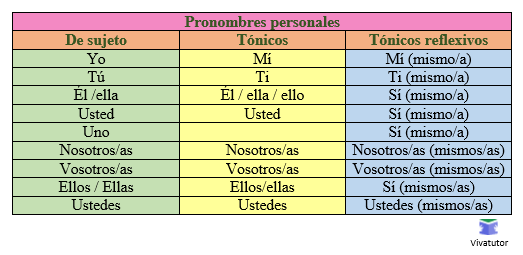Pronouns after preposition

Hola!
Today I wanted to clear up a grammatical point that is on the mind on every advanced student. What are those "mí, ti, sí" pronouns? Are they used after any preposition?
Here you have a grid and an explanation that hope is clarifying :)
Pronombres de sujeto / Subject pronouns
We use this ones to refer to a subject, so "who" does the action.
In English they'd be "I, you, he/she/it, we, you guys and they".
We're pretty used to them right? No problem.
Note: If you're unfamiliar with "uno" which literally means "one", we use it to talk impersonally, generally, and it follows the third person's endings (he,she, it). In English we usually translate it by "you", like in the following example:
- Uno quiere comprar y las tiendas están cerradas. - You/one wants to buy and the shops are closed.
Pronombres tónicos and tónicos reflexivos
We use both these pronouns after a preposition, with the exception of "with"("con").
Pronombres tónicos (second column)
We use these ones when the subject (who does the action) is not the same person as the "pronombre tónico" (to whomt the action affects somehow).
Examples (preposition highlighted):
- Está hablando sobre ti - She's talking about you.
- Tengo un regalo para él - I have a present for him.
- Estaban hablándome a mí, no a ti - They were talking to me, not to you.
- Este cuadro está pintado por ella y este por mí - This painting is painted by her and this one (is painted) by me.
- ¡Fíate de mí, no te fíes de ellos! - Trust me, don't trust them!
This post about "ello" will help you understand this particular pronoun.
Pronombres tónicos reflexivos (third column)
We use these ones when the subject and the "pronombre tónico" is the same person, so someone does the action and also is affected by it, just like it happens with reflexive verbs. They can include the word "mismo/a/os/as" or not, which means "self" and it's used to emphasise.
Let's see some examples:
- Te preocupas de ti (mismo) demasiado - You worry about yourself too much.
- Están muy seguros de sí (mismos) - They're very sure about themselves.
- Solo os ayudáis a vosotros (mismos) - You guys only help yourselves.
- Yo no hablo de mí (mismo) - I don't talk about myself.
- Debes creer en ti - You must believe in yourself.
- Se odia a sí misma desde el accidente - She hate herself since the accident.
What do I do with the preposition "with" then?
If you use the preposition "with", or "con" in Spanish you need to have some little information in mind.
Case 1: The"subject" and "pronombre tónico" are different people:
With me : Conmigo
With you (singular) :Contigo
All the rest work as normal: Con + pronoun. (Con nosotros, con ellos, con vosotras...).
Ex: Con vosotros es muy amable pero conmigo es muy borde - With you guys he/she is very kind but with me he/she is very rude.
Case 2: Both "subject" and "pronombre tónico" are the same person:
- Singular (one person): Conmigo, contigo, consigo
- Plural (more than one person): Con nosotros/as, con vosotros/as, consigo
Remember you can add "mismo/a/os/as" to highlight that meaning of "self".
Ex1: Está muy enfadada consigo (misma) pero no está para nada enfadada con nosotros - She's very angry at herself but she's not at all angry with us.
Ex2: Mis padres siempre llevan dinero consigo (mismos) pero nosotros nunca llevamos cosas importantes con nosotros - My parents always carry money with them but we never carry important things with us.
Done!!
Now remember, practice makes perfect. Write all the exemples in this post in a different order, with a gap for the pronoun and test if you can choose the right one.
Let me know how that goes on my social media platforms, I'd love to hear it.
¡Buena suerte! / Good luck!
